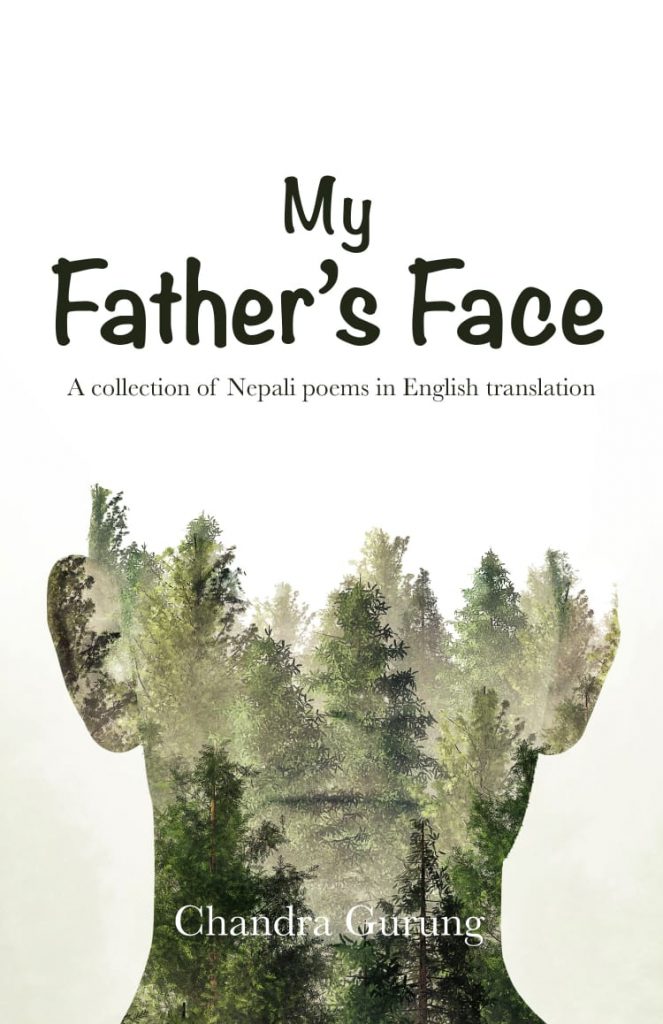
The way my mother’s countenance glitters
When from a land far-off
I return home
from ‘Mother’ by Chandra Gurung
Chandra Gurung is a poet from the remote village of Gorkha in Nepal who grew up in India, where his father was stationed in the Indian army.
His childhood was happy, yet he states, ‘the bad things were the geographical distances between my family members, especially with my mother. That made me experience solitude and loneliness as a child, and I was often deprived of many social connections.’
As a sensitive and shy boy, he preferred to remain alone; turning to his pen, words and books for comfort. He says, ‘to this day, these early emotions are still some of the strongest urges in my writing.’
With such a background, Chandra writes mainly when he is travelling and alone. He writes, ‘It is not that I write poems about just anything that comes to my mind, but I write only on those topics and themes that are of most interest to me, such as social and political issues and the predicament of human life. These are the subjects of many of my poems, as are the present deficiencies of humanity.’
Many of these subjects are contained within a 2020 publication of 47 of Chandra’s poems entitled ‘My Father’s Face’; written in Nepalese and translated into English by Mahesh Paudyal.
From his poignant words, it’s clear that Chandra’s love of his native Nepal and the people he has met within his life are of paramount importance to the poet.
Some, such as ‘Lovely Moon’ can be imagined as written by the poet simply seated and observing the world revolving around him.
The Moon,
Appears atop a hill
And stealthily descends
Slips into the well
Lands on a riverbank
Perhaps, it is looking for its love
Inside the night’s bosom
At other times, Chandra focuses upon his deeper social and political thoughts, as eloquently expressed in the poem, ‘Patriotism’.
He picked
The Sun and the Moon from my sky
And wrapped them in a piece of cloth
Dyed it in my blood
Washed it in my sweat
And said:
This is your national flag
He packed my faith
And my trust into a bundle
And placing the same in front of a statue
Said:
This is your national deity
This is your national religion
Reading through the collection of poetry, the main aspect that leaps out towards the reader is the beautiful simplicity and directness of the words that Chandra employs on every line.
Here is a man of simple truths and thoughts.
Here writes a poet who observes this material world and seeks enlightenment from everything he senses.
Chandra writes about the world as if he is portraying it through the lens of a camera. Nothing within the book is overly complex, nor does it need to be. Multiple adjectives are not required in order to express the notion of a tree, a landscape or a person.
This is perfectly expressed within the poem, ‘An Old Lamp Post’.
Beginning simply, we are the observers of a typical street scene, as witnessed through the ‘eyes’ of the lamp post.
An old lamp post
Stands quietly in the corner
And witnesses –
The kids playing on the road
The fatigued porters conversing at the square
The chitchat of the housewives on the adjoining veranda
And the friends meeting at the tea stall’
A scene adeptly expressed, as if we were right there in the street – maybe leaning on the lamp post and simply observing.
However as the poem nears its end, the energy of Chandra’s words have altered to a more sinister and darker level, following the introduction of some rioters who have pelted the old lamp post with rocks, which now stands alone.
It is unattended like a home abandoned in famine
Like a village devastated by an earthquake
No new bulb has been hung
No new paint has been applied
And my nation stands in the darkness of time
As does this old lamp post
Chandra has the simplistic talent of expressing his soul via language open and available to all; regardless of where they exist within this world. His words are like paint upon an enlightening easel, such as this poem called ‘Land of the Old Boatman’, beginning with a wonderful, descriptive tone and ending with an onomatopoeic flourish.
Dil Bahadur Majhi, an old boatman
Rows his days on the surface of the Narayani
Enjoys in the village of its water
Roves along its aquatic streets
Devoid of colour
Devoid of taste
Devoid of form
Lives a life like that of water
Like in the chest of the old boatman
This country aches in hearts
Countless in number
Plop…plop
Fizz…fizz
Plop…plop
Fizz…fizz
You may wish to get your own copy of Chandra’s book here.

